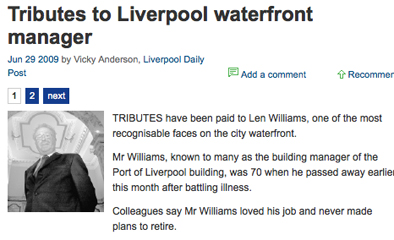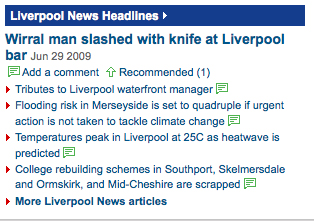It was an ‘oversight’ that Madeleine McCann related keywords were included in the metadata for every main local news story on the Liverpool Daily Post site, a Trinity Mirror spokeperson said, after Journalism.co.uk informed the company that the terms were present in the ‘hidden text’ of a series of unrelated news items.
The automatic inclusion of the keywords “madeleine mccann, madeleine mcgann, kate mcgann, kate mccann” in the HTML for Liverpool news stories has now ceased.
Journalism.co.uk learned in May that specific keywords, including those above, were used in the metadata for the ‘Liverpool News Headlines’ section on the Liverpool Daily Post site, regardless of the story’s relevance. This continued for at least one month before it was drawn to the Post’s attention on Monday (June 29).
Use of unrelated ‘hidden’ metadata is commonly known as ‘keyword stuffing’, a practice which Google firmly discourages. Using popular keywords can help improve a site’s SEO performance. [Update: Google and most other search engines are no longer believed (Wikipedia link here) to recognise these tags: see Lammo.net post at this link.]
Google search results for “Madeleine McCann + Liverpool” shows that the Post and its sister site, the Liverpool Echo, have top rankings for related Madeleine McCann stories. [Update: but lower rankings when a simple Madeleine McCann search is performed. It’s unlikely the addition of the keywords aided the LDP’s Google ranking. Google says: “While accurate meta descriptions can improve clickthrough, they won’t impact your ranking within search results.”]
A Trinity Mirror spokesman said: “The metadata was inserted some time ago when the Madeleine McCann story was at its height and was the most-searched item on our web sites. It was inserted to make it easier for our users to access a huge story of national and local interest. The fact that it wasn’t removed is an oversight, which has now been put right.”
The evidence (before Liverpool Daily Post corrected the error this week):
A story about Len Williams, a well-known waterfront manager who recently died.

![]()
The section of the site which used these keywords for all stories:

“‘Keyword stuffing’ refers to the practice of loading a webpage with keywords in an attempt to manipulate a site’s ranking in Google’s search results. Filling pages with keywords results in a negative user experience, and can harm your site’s ranking. Focus on creating useful, information-rich content that uses keywords appropriately and in context.
“To fix this problem, review your site for misused keywords. Typically, these will be lists or paragraphs of keywords, often randomly repeated. Check carefully, because keywords can often be in the form of hidden text, or they can be hidden in title tags or alt attributes.
“Once you’ve made your changes and are confident that your site no longer violates our guidelines, submit your site for reconsideration.”
A definition by Nathan Campbell on SEO.com:
“Some unethical SEOs choose to employ renegade tactics such as keyword stuffing. Keyword stuffing is overloading the content or meta tags of the web page with every possible keyword or phrase that relates to the site in many different forms.”
Thats really bad form. Its similar to how Habitat used the Iran hashtag to gain exposure. So was that hashtag stuffing?!
Couple of points: 1) The “keywords” meta tag is largely ignored particularly by Google. This is not the hidden keywords that google refer to and has little relevence to keyword stuffing. 2) Who the hell searches for “Madeleine McCann + Liverpool”?
Something made out of nothing here. Aren’t there bigger TM stories to cover today? Person inserts keyword into wrong automated CMS and doesn’t see error. Therefore, that isn’t keyword stuffing, that’s making an honest mistake. And the Liverpool papers were carrying McCann stuff long after others had lost interest because of the local angle. And if you were so offended by it why sit and watch it for a month?
DS is right, this isn’t keyword stuffing. Keyword stuffing relates to keywords that are actually on the page, rather than within the meta keywords tag. You can use the meta keywords tag all you want, but Google (and the majority of search engines) don’t place any importance on it. It is unlikely that they would have gained any boosts in rankings because of it. It’s also a fairly easy mistake to make.
Thanks for your feedback and criticisms.
@DS: I’ve added in a couple of updates and links in [] which I hope make clear that the keywords probably didn’t help them at all.
@Former: It wasn’t supposed to be a huge story, hence why it’s here on the blog, not on the main Journalism.co.uk page. We were alerted to it – it seemed bad practice and we asked LDP for a response. I kept an eye on it for a while to check it wasn’t a one-off error, thinking they might spot it themselves. My intention certainly wasn’t to sensationalise it. Many of our users are online journalists – it seemed pertinent and of interest.
@Dave: It seems there are varying definitions of ‘stuffing’. Some do include meta-tags in their definition – even if no longer effective as an SEO tool. Here’s the Wikipedia definition (as of 01.07.09): “Keyword stuffing is considered to be an unethical search engine optimization (SEO) technique. Keyword stuffing occurs when a web page is loaded with keywords in the meta tags or in content. The repetition of words in meta tags may explain why many search engines no longer use these tags.”
Journalist uses Wikipedia definition. Enough said.
I’m not sure I find their excuse all that confusing:
“The metadata was inserted some time ago when the Madeleine McCann story was at its height and was the most-searched item on our web sites. It was inserted to make it easier for our users to access a huge story of national and local interest. The fact that it wasn’t removed is an oversight, which has now been put right”
What, they auto added it to every story to make it easier? Does this mean 51% of what they published at that time was about the McCanns so it was easier to remove it from non-McCann stories than add it to ones about them?
How was it helping people find them? It must have confused their internal search engine if nothing else.
I can’t see any reason to do this. It’s not going to help anyone find anything – which means there is no reason to do it.
If they thought it would help, I can see why they might get carried away and add it to everything, and then wish they hadn’t.
@smartalec: I was waiting for that one… as a rule of thumb I avoid Wikipedia references, but in the case of tech definitions without an OED entry which can vary blog to blog, it seemed reasonable to use – alongside other definitions (other blog links provided in the post updates). I looked at various threads on WebmasterWorld: here’s their definition: http://www.webmasterworld.com/glossary/keyword_stuffing.htm
Or for another online encylopedia, as a comparison, there’s Webopedia: http://www.webopedia.com/TERM/K/keyword_stuffing.html.